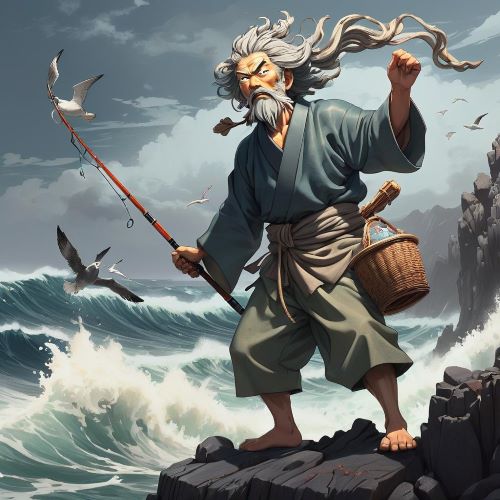Japanese Demigods
Japanese demigods are fascinating figures in the rich tapestry of Japanese mythology, embodying the unique blend of human and divine traits that characterize these intriguing beings. These demigods, born from the union of gods and mortals or through extraordinary circumstances, hold a special place in Japanese folklore. Their stories reflect the complex relationship between the divine and the mortal, highlighting the values, beliefs, and cultural heritage of Japan.
In Japanese mythology, they often possess extraordinary abilities and play significant roles in various mythological narratives. They are depicted with a combination of human and supernatural qualities, reflecting their unique heritage. These beings are often seen as heroes or pivotal figures who undertake remarkable quests, combat formidable foes, or influence major events. Their actions and adventures serve to bridge the gap between the divine and the human realms, offering a window into the broader cosmological beliefs of Japanese culture.
The diversity among Japanese demigods highlights the complexity and richness of Japanese mythology. Each demigod has distinct characteristics, powers, and stories that contribute to their significance within the mythological framework. Some are revered as protectors or bringers of prosperity, while others are celebrated for their bravery and achievements. Their tales often explore themes of courage, honor, and the interplay between fate and free will, reflecting the moral and ethical values embedded in Japanese folklore.
Modern interpretations of Japanese demigods have expanded their presence beyond traditional myths, bringing these characters into contemporary cultural contexts. In literature, anime, manga, and film, Japanese demigods continue to captivate audiences with their dynamic stories and compelling attributes. This modern portrayal helps to preserve the rich heritage of Japanese mythology while making it accessible to new generations and a global audience. By engaging with these demigods through various media, the cultural legacy of Japanese mythology remains vibrant and influential.
Exploring the realm of Japanese demigods offers a deeper understanding of the spiritual and cultural dimensions of Japanese mythology. Their stories and attributes reveal much about the interplay between the divine and the mortal, highlighting a rich tradition of mythological narrative and cultural expression. Whether through ancient texts or modern adaptations, Japanese demigods remain a powerful symbol of the enduring legacy of Japanese mythology and its impact on both historical and contemporary contexts.
Japanese demigods are fascinating figures in the rich tapestry of Japanese mythology, embodying the unique blend of human and divine traits that characterize these intriguing beings. These demigods, born from the union of gods and mortals or through extraordinary circumstances, hold a special place in Japanese folklore. Their stories reflect the complex relationship between the divine and the mortal, highlighting the values, beliefs, and cultural heritage of Japan.
In Japanese mythology, they often possess extraordinary abilities and play significant roles in various mythological narratives. They are depicted with a combination of human and supernatural qualities, reflecting their unique heritage. These beings are often seen as heroes or pivotal figures who undertake remarkable quests, combat formidable foes, or influence major events. Their actions and adventures serve to bridge the gap between the divine and the human realms, offering a window into the broader cosmological beliefs of Japanese culture.
The diversity among Japanese demigods highlights the complexity and richness of Japanese mythology. Each demigod has distinct characteristics, powers, and stories that contribute to their significance within the mythological framework. Some are revered as protectors or bringers of prosperity, while others are celebrated for their bravery and achievements. Their tales often explore themes of courage, honor, and the interplay between fate and free will, reflecting the moral and ethical values embedded in Japanese folklore.
Modern interpretations of Japanese demigods have expanded their presence beyond traditional myths, bringing these characters into contemporary cultural contexts. In literature, anime, manga, and film, Japanese demigods continue to captivate audiences with their dynamic stories and compelling attributes. This modern portrayal helps to preserve the rich heritage of Japanese mythology while making it accessible to new generations and a global audience. By engaging with these demigods through various media, the cultural legacy of Japanese mythology remains vibrant and influential.
Exploring the realm of Japanese demigods offers a deeper understanding of the spiritual and cultural dimensions of Japanese mythology. Their stories and attributes reveal much about the interplay between the divine and the mortal, highlighting a rich tradition of mythological narrative and cultural expression. Whether through ancient texts or modern adaptations, Japanese demigods remain a powerful symbol of the enduring legacy of Japanese mythology and its impact on both historical and contemporary contexts.

